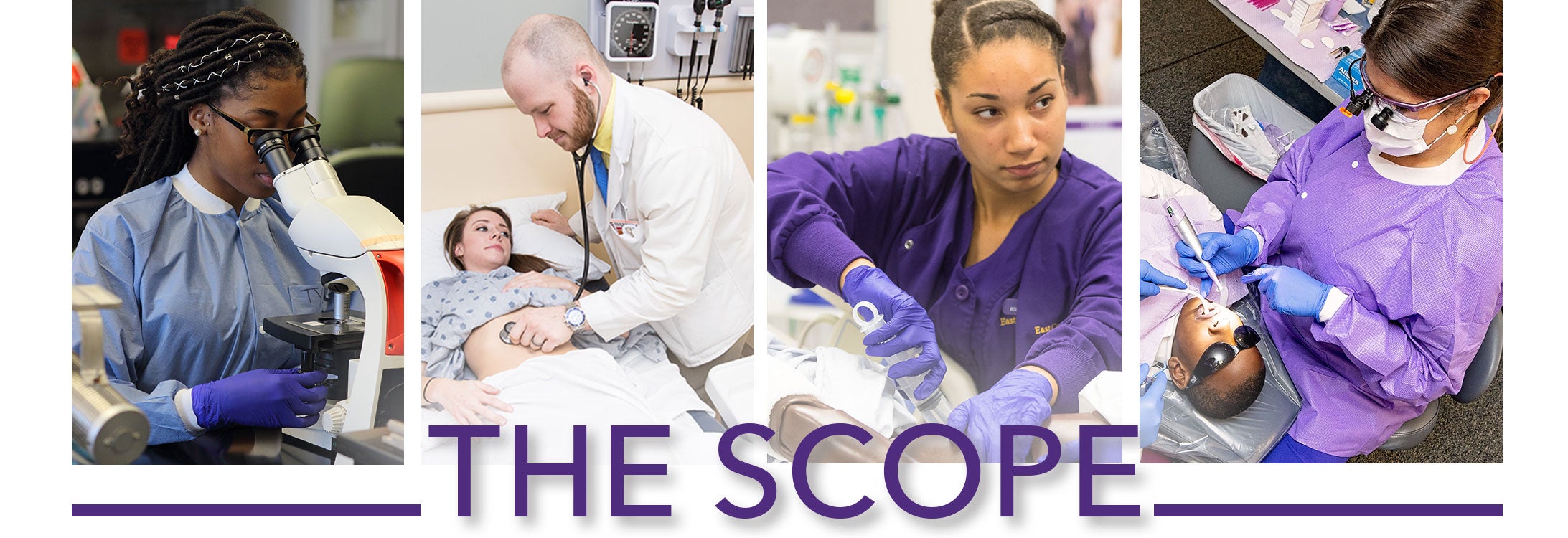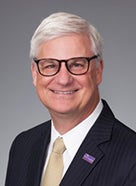December 2020
Welcome to “The Scope,” the newsletter of the ECU Division of Health Sciences.
Welcome to the December issue of The Scope, the newsletter of the ECU Division of Health Sciences.
A fascinating feature of humanity is our ability to adapt and surpass expectations in the face of unfamiliar territory. We may wonder how we would react given certain situations in our careers and lives, yet sometimes we surprise ourselves through an instinctive determination to withstand difficulty.
A pandemic wasn’t on our list of anticipated events this year, but it has been a test of the good that can come from facing the unthinkable with courage and collaboration. Each of you who are part of the ECU Division of Health Sciences has called upon your expertise, compassion, drive—and your inherent good—to respond to a public health crisis and to stay the course toward the best possible patient care and educational experiences.
We also experienced polarization and unrest in our community and across the nation. That divisiveness led to difficult but meaningful conversations toward seeing things from other people’s perspectives, understanding inequity in everyday life that many people experience and finding common ground to strengthen our dedication to diversity and equality.
It was a trying time, but it was also a promising time as this division proceeded headstrong into what we are here to do—to be a beacon in the face of a public health crisis and a driver of an expert response that includes care, research and education in order to keep our communities safe and healthy.
While implementing and adhering to strict safety guidelines, we celebrated new treatment and care delivery options for our patients, research breakthroughs by our scientists, and we witnessed the ways our students and alumni are applying what they learned in the classroom to serve their communities. The impact of our division’s knowledge and compassion stretched beyond campus and clinics. Our students, faculty and staff also reached out to underserved populations throughout this pandemic to provide them access to health care, technology and PPE that they would have otherwise gone without.
By virtue of who we are and what we do, ECU’s Division of Health Sciences was prepared to seek solutions to protect people from a novel virus and a health emergency that continues to evolve worldwide. Our providers have also done a spectacular job under unprecedented conditions to address patients’ ongoing health care needs that cannot be put on pause.
Even in the midst of fear, sickness and uncertainty, it was a joy to watch the people in our division use their knowledge and talents for the good of others.
This special Year in Review issue of The Scope takes a look at the challenges and accomplishments that ECU’s Division of Health Sciences experienced over the course of 2020. My wish is that reflecting on the highlights featured in this newsletter inspires all of us to enter the new year undaunted—a promising start to 2021 with a new chancellor at the helm of our great university.
Like each of the obstacles we have faced from our first days as a division, we will come through this and emerge on the other side more equipped to be better providers, better educators, better researchers—and just simply better.
Throughout the holiday season and into the months ahead, may the positivity, hope and good in all of us continue to sustain us and all those who cross our paths.
Mark Stacy, MD
Dean, Brody School of Medicine
Vice Chancellor, Division of Health Sciences
Education
The division’s students, faculty and staff found ways to transform traditional teaching and learning this year as brand-new circumstances emerged.
In mid-March, fourth-year students in the Brody School of Medicine learned where they would complete their residencies during a drive-thru Match Day event. The highly anticipated Match Day ceremony normally held in the Brody Auditorium in front of family, friends and faculty was celebrated differently because of social distancing guidelines on large gatherings due to the COVID-19 pandemic.
The Clinical Simulation Center worked to assist students, instructors and colleagues who are unable to be on campus by providing on-demand simulation and skills sessions throughout the pandemic using telesimulation. The center has also distributed supplies to students and proctored exams. Clinical Simulation Program’s leaders also recently authored a chapter, “Mobile Simulation,” in the 2nd edition of “Defining Excellence in Simulation Programs,” endorsed by the Society for Simulation in Healthcare.
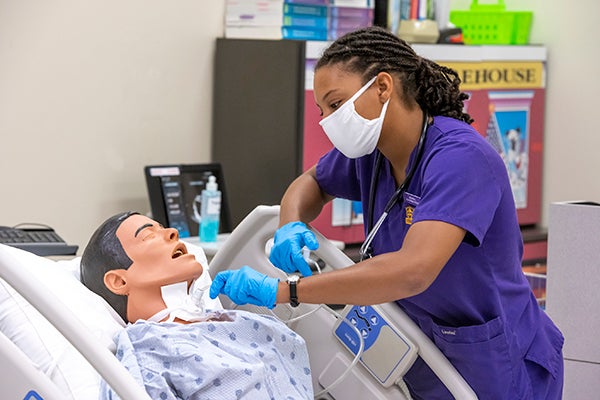
The College of Nursing, celebrating its 60th anniversary, also welcomed its most diverse BSN class ever. The milestones were marked during a time when nurses worldwide responded on the front lines of the COVID-19 pandemic.
By the end of March, faculty across the division and university were adapting to providing education in new ways, while caring for patients. Courses were re-formatted for web-based instruction in as little as two days. Dr. Luan Lawson, associate professor in emergency medicine and associate dean for curricular innovation in medical education, assessment and clinical academic affairs in the Brody School of Medicine, said most of the success of rapidly switching to virtual teaching stems from teamwork between academic affairs leaders and faculty.
“The faculty have demonstrated tremendous dedication to our students as they have worked nonstop to ensure our learners have been able to remain engaged in the curriculum,” she said, calling the pandemic “the most complex situation we have ever encountered in modern medical education.”
The division’s Office of Clinical Skills Assessment and Education (OCSAE) worked to ensure students’ requirements could be met during the pandemic using interactions with standardized patients, which provide students opportunities to learn without risk to actual patients through in-person simulations and interactions. Some program components shifted to a web-based format to support social distancing.
The division celebrated its graduating students during web-based events that featured video messages from deans, faculty and staff and honored the accomplishments of the Class of 2020.
Even during a pandemic, students in the Division of Health Sciences stayed the course. Students from the School of Dental Medicine and the Brody School of Medicine were named N.C. Schweitzer Fellows. The seven students began working on projects aimed at addressing public health problems in their study areas and improving health for the people in their communities.
Students from across the division also returned to clinics this summer, to resume clinical rotations and learning experiences on campus and beyond. Students in the College of Nursing kicked off the return to campus in June. The Brody School of Medicine also brought students back to campus for classes and clinical rotations that same month. Students in the School of Dental Medicine returned to clinics across the state after faculty and residents treated emergency cases during the first months of the pandemic to ease the burden on hospital emergency departments.
Four students in the Brody School of Medicine are the first to earn a graduate certificate in ethnic and rural health disparities as part of the school’s service-learning distinction track this year. “‘Knowledge is power,’ and this certificate is another experience that will help me become the best physician I can be,” student Hannah Conley said. “A person’s health is influenced significantly by circumstances and factors outside of the hospital or clinic, and my completion of the ERHD certificate represents a major milestone in my education where I now know how to start addressing health disparity issues.”
The College of Nursing, celebrating its 60th anniversary, also welcomed its most diverse BSN class ever. The milestones were marked during a time when nurses worldwide responded on the front lines of the COVID-19 pandemic. The National League for Nursing also designated the college a Center of Excellence in Nursing Education for a fourth time, recognized in the areas of Enhanced Student Learning and Professional Development.
This fall, Dr. Wanda Wright was named the School of Dental Medicine’s first assistant dean for diversity, equity and inclusion. Wright, who has been with the school since 2015, is also assistant professor and division director of dental public health. She will serve as a member of the School’s senior leadership team and will contribute to the recruitment, retention and success of underrepresented faculty, staff, students and residents.
The Department of Health Services and Information Management in the College of Allied Health Sciences received a two-year grant for $144,000 from Simio, LLC for teaching and research support. Dr. Leigh Cellucci, professor and interim department chair, secured the grant that includes access to the company’s simulation software.
Outreach
The division renewed its energy for outreach this year, bringing our missions to life through community efforts and increased access to care and resources for others.
Together with fundraising committee co-chair Luyao Yan, other ECU faculty and other members of the area’s Chinese community, Dr. Xiaoming Zeng, professor and chair of ECU College of Allied Health Sciences’ Department of Health Services and Information Management, led fundraising efforts through the Greenville Chinese School to raise $15,000 toward personal protective equipment for Greenville’s health care workers. The group also sourced the materials through their connections in China, vetted the suppliers and certification of the supplies and had them shipped to Greenville.
Although the pandemic forced Laupus Library to close in March, it continued to fulfill the research, service and informational needs of the health sciences community. Laupus also provides interlibrary loan and document delivery and has offered curbside pickup of circulating collections to faculty, staff and students.
“Now more than ever the need for quality, evidence-based health information is integral to providing care to our community, and Laupus is the leader in this region in acquiring and providing that information,” said Beth Ketterman, director of Laupus Library. “We have developed a robust and accessible electronic collection, so we were able to pivot really quickly to an online service model when the library closed.”
A School of Dental Medicine alumna recognized the food insecurity in her western North Carolina community and created the AppHealthCare Community Dental Garden, which produced more than 300 pounds of produce this year that helped feed 70 families. Dr. Amanda Stroud ’15 hopes to build the garden into a resource that eventually funds pediatric dental care.
In March, dental students, faculty and staff gathered at the school’s community service learning center in Elizabeth City to provide a hands-on dental school experience for high school and college students interested in pursuing dentistry as a career. The event, “Preparing Tomorrow’s Dentists: Dental CSI” is one of the school’s pipeline programs to increase access to potential dental students from rural and under-resourced areas of the state.
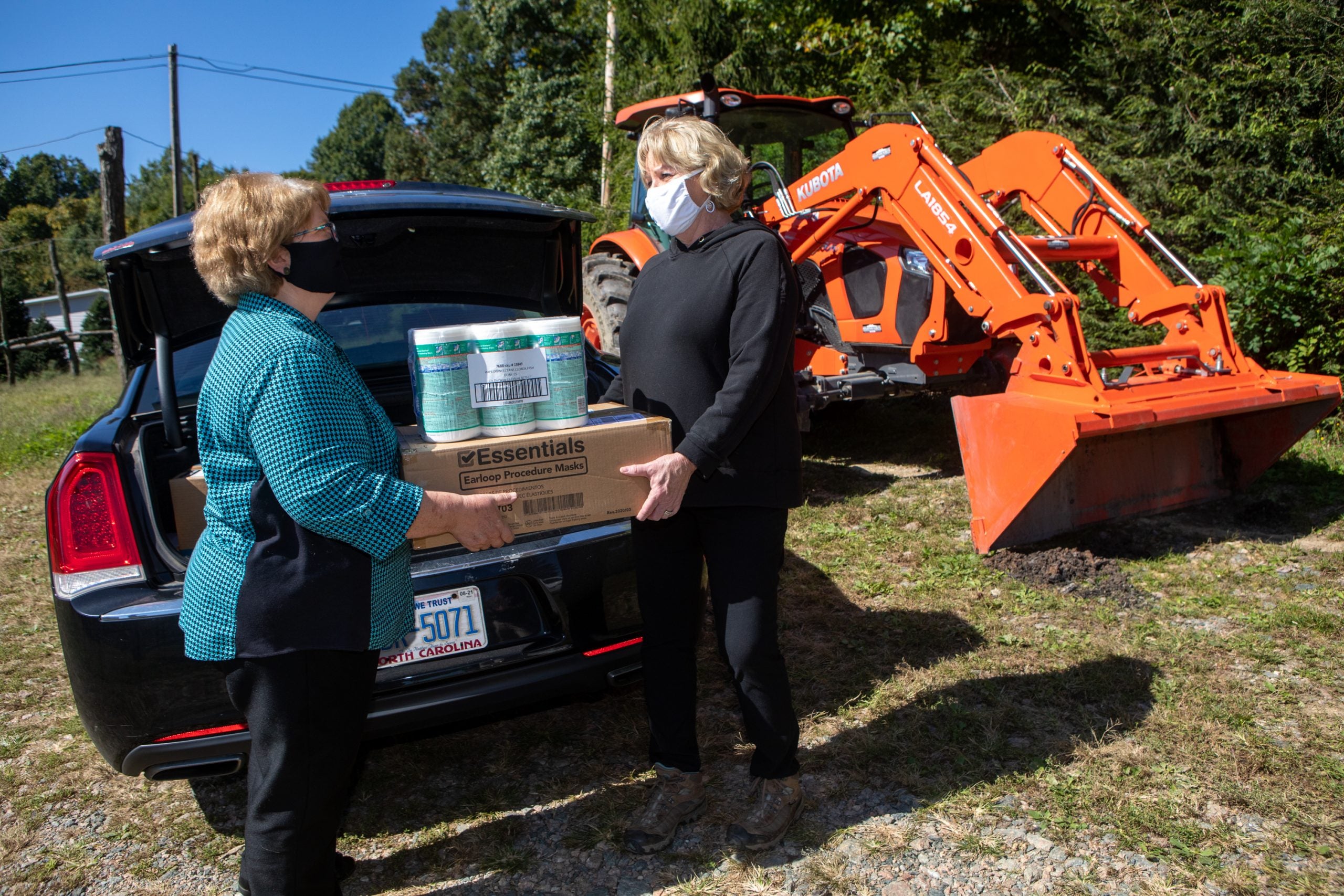
Dr. Robin Tutor Marcom, director of the North Carolina Agromedicine Institute hands protective masks and disinfectant wipes to Tracy Taylor, owner of Stone Mountain Farms in Vilas, N.C. (Photos by Marie Freeman, Appalachian State University)
Dr. Anne Dickerson, professor of occupational therapy in the College of Allied Health Sciences received the 2020 Governor’s Award for Excellence in Public Service from North Carolina Gov. Roy Cooper in a virtual ceremony Oct. 27. Dickerson was one of 13 people recognized for service and contributions that “go beyond the call of duty and make a positive difference in the lives of their fellow North Carolinians.” Dickerson established a summer driving boot camp for young adults with autism spectrum disorder.
The North Carolina Agromedicine Institute helped provide N95 masks and other personal protective equipment to migrant farm workers to protect them during the COVID-19 pandemic. The institute is a partnership between ECU, North Carolina State University and N.C. A&T State University that advocates for the health and safety of farmers, fishermen, foresters, their workers and their families through research, prevention/intervention and education/outreach.
The ECU’s Healthier Lives at School and Beyond School-Based Telemedicine Program used an ECU Transit bus to visit schools in Duplin County to connect students and staff with quality behavioral health, nutrition, dental and acute medical care services. The mobile unit has been used to provide screenings for close to 100 students so far, with additional visits planned. The ECU Brody School of Medicine-led initiative was created with a federal grant and provides telehealth screenings to eastern North Carolina children.
Laupus Library has been awarded a $75,000 grant through the Institute of Museum and Library Services to provide laptops and health education instruction to the school-aged children of migrant farmworker families in eastern North Carolina.
The library purchased 100 laptops to be distributed in November to middle- and high-school children in Wayne and Pitt counties. Beth Ketterman, Laupus Library director, said laptops were chosen as the device to best meet the needs of these students. The project dovetails a previous grant coordinated by Dr. Joseph Lee, from the Department of Health Education and Promotion in the College of Health and Human Performance, which provided hotspot internet connectivity for these same migrant communities.
“The shift to remote instruction upended education in the greatest of ways,” said Ketterman. “Providing a device that is not just loaned but given to a student who has the added challenge of potentially moving during the pandemic, means they can have a consistency in access to their learning materials.”
Governors Award for Excellence for Public Service 2020: Anne Dickerson
Video of Governors Award for Excellence for Public Service 2020: Anne Dickerson. Visit this video on YouTube for the closed-captioned version.
Research
The division’s research focus hit new heights this year, addressing immediate health threats and ongoing important research topics.
ECU became a site for a clinical trial aimed at preventing COVID-19 from causing fatal lung damage in patients. Dr. Paul Cook, chief of the Division of Infectious Diseases at ECU’s Brody School of Medicine, began enrolling patients June 1 in a clinical trial investigating a new treatment aimed at preventing and shortening the duration of Acute Respiratory Distress Syndrome (ARDS). ARDS is a characteristic of COVID-19 that occurs when fluid builds up in the lungs and prevents oxygen from entering the bloodstream.
An ECU infectious disease specialist at Vidant Medical Center was among the first to trial a new COVID-19 antibody treatment that was granted an emergency use authorization (EUA) by the U.S. Food and Drug Administration. Dr. Paul Cook, chief of the Division of Infectious Diseases at ECU’s Brody School of Medicine, began enrolling patients in August in the clinical trial investigating the monoclonal antibody treatment now named bamlanivimab developed by pharmaceutical company Eli Lilly.
East Carolina University’s Brody School of Medicine is putting the CARES Act funding it received from the North Carolina General Assembly toward developing better treatments, advancing vaccine research and minimizing COVID-19’s impact in the region and state while contributing to the global body of knowledge about the novel coronavirus.
More than 20 different projects have received funding from the $15 million the school was granted by the state legislature for COVID-19 initiatives. The projects primarily fall into three categories related to COVID-19: treatments to enhance innate immunity to the virus, vaccine development and community testing initiatives. Other funded projects aim to support high-risk and rural populations in the region and advance efforts to slow transmission.
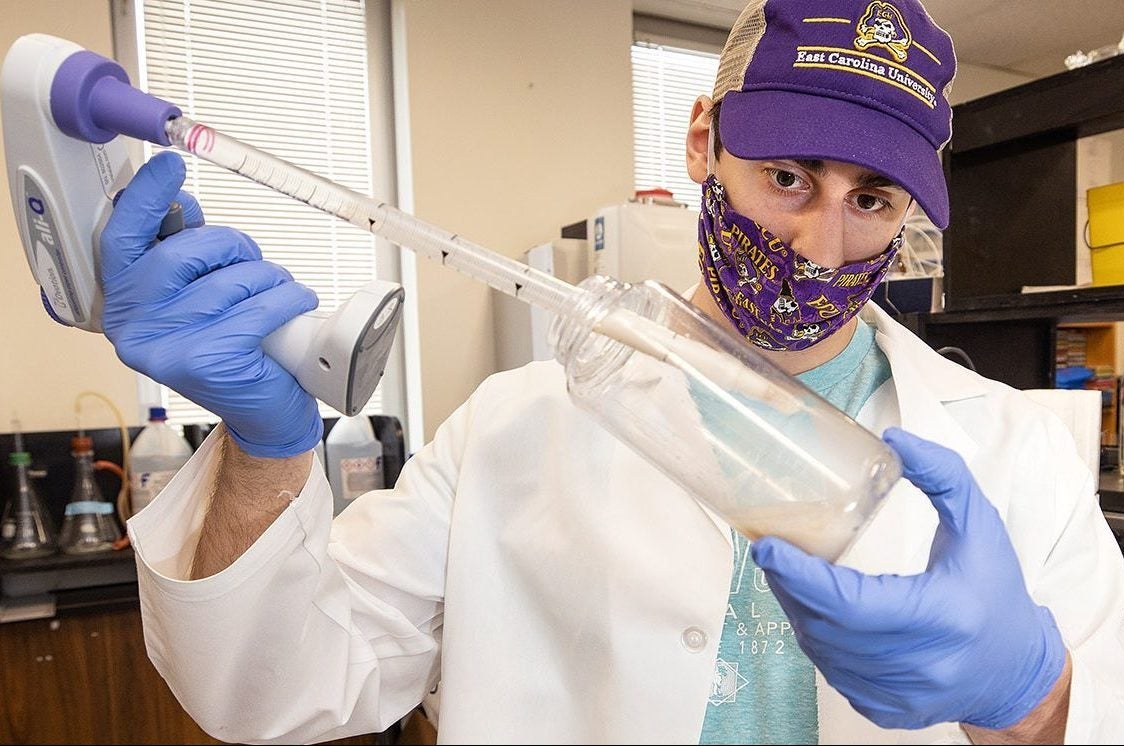
Brody School of Medicine student Chris Kulp is one of several PhD students in the Department of Biochemistry working to identify ways to inhibit the interaction of three SAR-CoV-2 proteins with their potential host. (Photo by Rhett Butler)
A team of ECU public health experts led a statewide partnership exploring the impact of the COVID-19 coronavirus pandemic on North Carolina. Based in ECU’s Brody School of Medicine and the College of Nursing, the researchers join others from UNC-Chapel Hill, Duke University and the N.C. Division of Public Health. The universities use surveys and testing to explore the numbers of people infected with COVID-19. The survey focuses on virus trends in Cabarrus, Chatham and Pitt counties and how the virus impacts physical and mental health, family, economy and other factors in those counties. Survey participants will also submit samples to be tested for coronavirus.
As the pandemic raged on, ECU medical and scientific experts answered some of the most pressing questions about COVID-19. Division experts and providers took the time to do interviews with media and for various ECU communications-produced stories, podcasts and videos in order to share their knowledge on the virus—helping to educate the public and combat misinformation.
A PhD student in the Brody School of Medicine’s Department of Anatomy and Cell Biology earned a highly competitive fellowship from the Male Contraceptive Initiative (MCI), supporting his efforts to identify potential male contraceptive drug targets. The fellowship includes $50,000 per year for two years to identify molecular targets that can be further used to design safe, non-hormonal, reversible male contraceptive drugs.
The Office of Medical Education sponsored the 23rd annual Medical Student Scholarship Forum. Medical and dental students presented on their summer research completed under the mentorship of faculty. “The Summer Scholars Research Program was the first time I had participated in formal research,” said Tyler Reason, a first-year dental student and 2019 ECU graduate. “It was important for me to learn how research relates to dentistry and how to follow evidence-based dentistry in school and beyond. Although I did not have previous research experience, the program allowed me to learn the many attributes of conducting research.”
Dr. Holly Wei, associate professor in the College of Nursing, helped author a study that looked at nurses in China and provided guidance to help all nurses adjust psychologically to the demands of serving on the front lines during the pandemic.
Patient Care
The division ushered in 2020 with novel approaches to patient care and creative ways to solve problems—well before the novel coronavirus dominated headlines.
Doctors at Brody and Vidant Medical Center were the first in North Carolina to perform a new radiation therapy procedure that is giving hope to patients with recurrent brain tumors. GammaTile Therapy is a surgically targeted radiation therapy in which a 3D-collagen tile, embedded with radioactive Cesium-131 rods, is placed in the tumor cavity at the time of surgery. The tile immediately begins delivering targeted radiation treatment to the tumor cells – at a higher dose than traditional external beam radiation.
A Brody School of Medicine team called on a canine tracker to sniff out C. diff, a bacterium common in health-care settings that can cause severe diarrhea, colitis and other complications. The beagle partnered with Dr. Paul Cook, professor of medicine and chief of Brody’s Division of Infectious Diseases to, with the support of Vidant Health, go step further to eradicate the threat of C. diff in the hospital and ensure that patient treatment areas are as safe and sterile as possible.
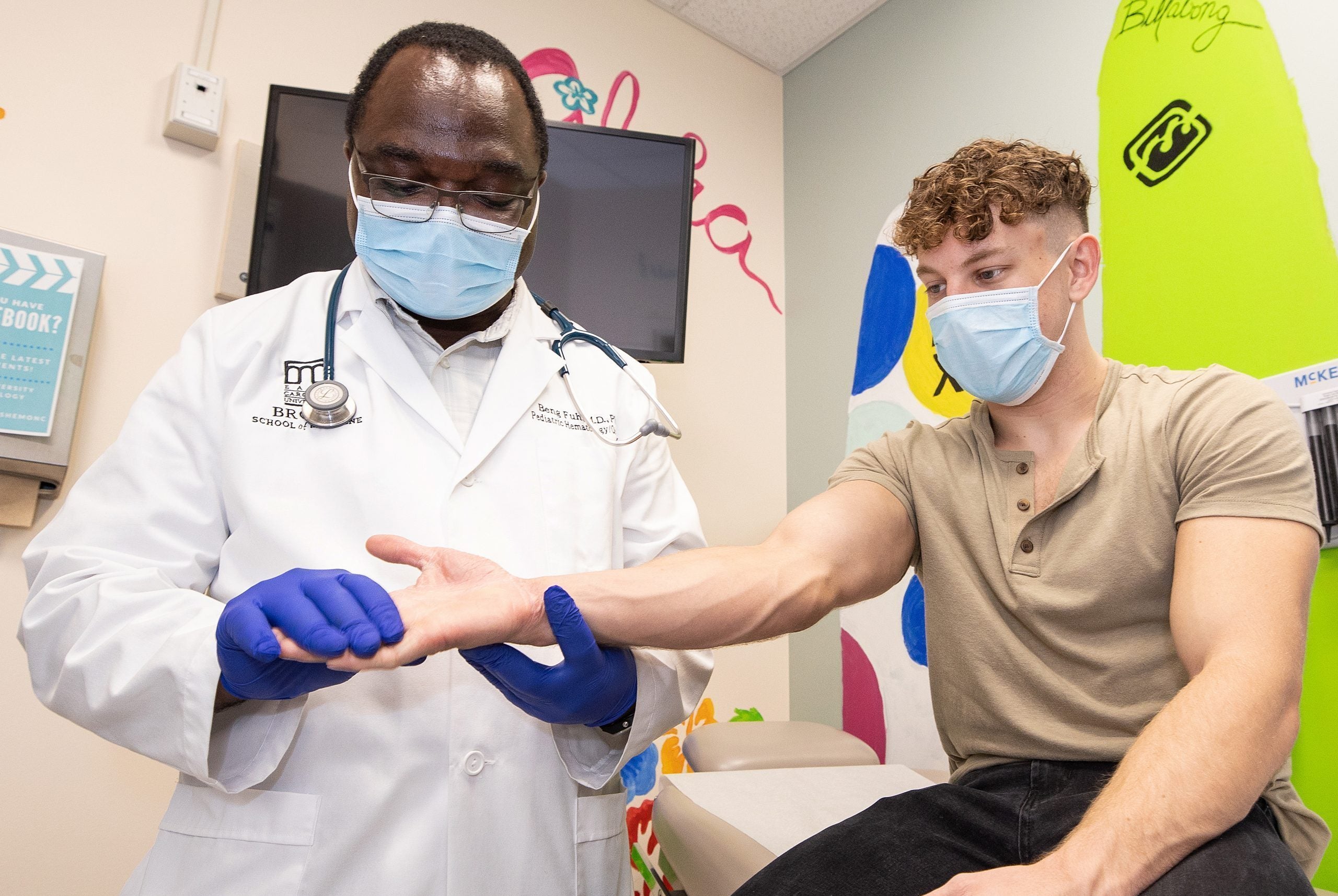
Oncology Pediatrician Dr. Beng Fuh, evaluates the progress and healing of Luke Haithcocks’ hand. (Photo by Rhett Butler)
ECU medical and nursing alumni responded to the COVID-19 pandemic in their communities near and far. Dental school alumni also worked in hospitals and offices in North Carolina and in virus hotspots to provide emergency dental care to patients during the pandemic.
Physicians from Brody and Vidant Health performed a clinical procedure that uses antibodies from people who have recovered from COVID-19 to treat patients suffering from the novel coronavirus. In April, a COVID-19 patient at Vidant Medical Center was one of the first in North Carolina to receive antibodies from a plasma donor – through a process called plasmapheresis – who previously had a documented case of COVID-19.
ECU and Vidant also teamed up to treat a rare cancer in a pediatric patient—who is now an ECU undergraduate. The rarity of the disease, its location and the patient’s age at diagnosis make ECU and Vidant one of only a few centers around the country with experience in treating it.
The School of Dental Medicine earned a $3.1 million grant from the Health Resources and Services Administration this year to enhance resident training in the care of patients with special needs in eastern North Carolina and across the state. One of the largest in the dental school’s history, will focus on improving dental care for pediatric and elderly patients as well as those with mobility issues and other complex health problems and those with mental, emotional and behavioral challenges.
“This grant highlights our mission and strong community partnerships,” said Dr. Greg Chadwick, dean of the School of Dental Medicine. “It positions our residents and future dentists to work in rural communities and learn to engage and respond to patients’ complex health challenges.”
In April, ECU Physicians began providing opportunities for anyone with COVID-19-related symptoms to see and speak to a physician via virtual visits. This includes those who may not have a regular primary care physician or whose primary care provider does not have telehealth capabilities. Dr. Jason Foltz, chief medical officer of ECU Physicians, said the practice is taking these steps as a service to the large number of people who may be experiencing COVID-19-related symptoms, but have limited health care options.
“The hope is to provide more access to testing for folks who need it and also to prevent unnecessary visits to emergency rooms or physicians’ offices,” Foltz said.
ECU Physicians has provided testing sites throughout the pandemic, to ease the burden on offices and providers; that team was celebrated as part of ECU’s ‘unsung heroes’ employees who went above and beyond during pandemic response. ECU Physicians also responded by offering ECU faculty and staff a drive-thru flu vaccination clinic during October after division employees were urged to receive the flu vaccination as soon as possible. ECU Physicians nurses and other providers manned the drive-thru stations, ensuring safety and efficiency during the clinics.
Mental health care will become more critical during the COVID-19 pandemic and after it subsides. Through the North Carolina Statewide Telepsychiatry Program (NC-STeP) based at ECU, the university is poised to help address the influx of mental health care needs, said Dr. Sy Saeed, professor and chair of the Department of Psychiatry and Behavioral Medicine in the Brody School of Medicine. A team in the department also received a $1.2 million federal grant this year to expand telehealth-based mental health services in North Carolina.
Clinicians in the College of Allied Health Sciences’ Navigate Counseling Clinic transitioned to providing all of its mental health counseling services using WebEx, FaceTime and telephone. The Navigate Counseling Clinic provides free mental health services for the local community as well as ECU students and employees.
Dr. Jan Tillman, a clinical associate professor at the College of Nursing and board-certified family nurse practitioner, coordinated a collaboration between the ECU College of Nursing and the North Carolina Department of Health and Human Services (NCDHHS) as a volunteer, pairing health care providers across the state with the long-term care facilities that need them urgently.
Dr. Kim Stokes, director of clinical education for the department, is the principle investigator on the $1.2 million Physician Assistant Program Primary Care Training Enhancement grant, an interdisciplinary project that includes faculty from other departments within the College of Allied Health Sciences, as well as the Brody School of Medicine, and emphasizes interprofessional collaboration among health care students to achieve better patient outcomes.
Video of ECU Physicians flu shot drive-thru. Visit this video on YouTube for the closed-captioned version.
Philanthropy
Despite the enormous challenges of 2020, the ECU Medical & Health Sciences Foundation saw good results during the first six months of the fiscal year. Alumni and supporters of the colleges and schools of ECU Health Sciences and Laupus Library have remained very generous. Gifts and pledges are on pace with previous years, and planned gifts and support from corporations and external foundations have increased.
“We are extremely grateful for all our donors who continue to provide tremendous support to the efforts of the people of ECU Health Sciences—it’s making the world a better place,” said Dr. Herb Garrison, interim president of Medical & Health Sciences Foundation, Inc.
Below are some examples of the wide-ranging support ECU Health Sciences received this year:
- The School of Dental Medicine received a $3.2 million grant to continue its Scholarships for Disadvantaged Students program, funding scholarships for economically disadvantaged students over the next five years. The grant from the Health Resources and Services Administration is a renewal of a similar award in 2016 and provides opportunities for the school to increase the recruitment, retention and graduation of students from disadvantaged backgrounds, including under-represented minority students, who will eventually practice as primary care dentists in underserved areas of North Carolina.
“The scholarship program is exactly in alignment with our school’s mission,” said Dr. Margaret Wilson, vice dean of the School of Dental Medicine. “HRSA has been wonderful in their support of us.”
- Pregnant women in North Carolina’s rural communities increasingly face a lack of access to quality maternal health services. East Carolina University’s Brody School of Medicineis working hard to address this issue, and a $1.25 million grant from the United Health Foundation will greatly support the school’s efforts. The funding will help develop a new care model for high-risk patients, expand telepsychiatry services to better address the mental health needs of expectant and new mothers, and decrease food insecurity among pregnant women.
- Nancy Vincent (non-alumna) planned gift for the ENC Regionally Increasing Baccalaureate Nurses (RIBN) program, which provides students with a four-year option in which they complete an Associate degree and Bachelor’s degree in nursing. The ENC RIBN program dually admits students to ECU and one of the local community colleges that partner with the ECU College of Nursing.
Vincent had worked for many years as the controller for a very large doctor’s office in Raleigh and knew the critical role of health care—including the kindness and knowledgea of nurses. She decided to give to a nursing program, but outside the Piedmont area. As she explored online her options, she came across the RIBN program at ECU. Vincent was impressed with the program’s success at efficiently getting BSN nurses into rural areas of NC, she included them in her will. Within another couple of months, she increased the amount she will leave to the program. While enrolled in nursing at one of 10 community colleges, students are dually enrolled at College of Nursing. Once they complete their NCLEX test, they can complete the last part online at College of Nursing. Some even continue to work part-time in their rural locales as they complete the BSN portion of their degree.
Additionally, Nancy made a current gift to her endowment’s support fund this year so next year she can actually meet the first recipient of her future endowment, Hope and a Future Scholarship in Memory of Howard Beasley and Nancy Vincent.
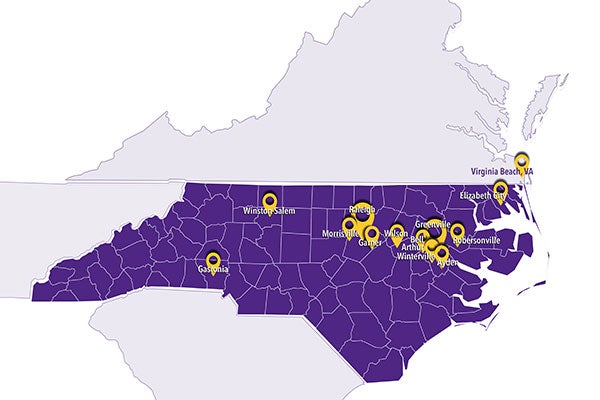
Throughout the COVID-19 pandemic, Laupus Library loaned laptops to ECU students located in North Carolina and Virginia with their expanded equipment loan program.
- With support from the Medical & Health Sciences Foundation, Laupus Library was able to purchase additional e-books for distance-learning curriculum and clinical information resources related to infectious diseases. E-book access will help students, faculty and clinicians continue learning without having to borrow print materials onsite.
- The library also received funds for WiFi hotspots that can be loaned out to students who need to access the internet from home or other remote learning sites. The hotspots are available through the library’s equipment loan program which also includes laptops, cameras, charging cords and other items that can be picked up during library operating hours.
- A $400,000 grant from the Duke Endowment is making it possible for the School of Dental Medicine to go a step further in delivering oral health care to children in Bertie County through the Bertie County School Based Oral Prevention Program. According to the 2015-2016 Kindergarten Oral Health Status Report by the North Carolina Department of Health and Human Services Oral Health Section, 19% of the kindergartners screened in Bertie County had untreated tooth decay. The same study found that 15% of kindergarteners screened state-wide had untreated tooth decay.
- Select Equity Group, L.P. donated $10,000 to provide research support to Dr. Rachel Roper and her vaccine research in the Department of Microbiology and Immunology. The funds are crucial to her continued work on improved vaccine development, Roper said, because they can support the purchase of cells, reagents, chemicals, enzymes and antibodies for vaccine development and immune analysis. “This funding will allow us to buy supplies and help support personnel working to create improved vaccine platforms for COVID-19, other infectious diseases and even for cancer treatment,” Roper said.

Dr. Rachel Roper, an associate professor in the Department of Microbiology and Immunology, is one of the world’s leading microbiologists studying coronaviruses. Funding provided by the general assembly, as well as $10,000 from Select Equity Group, L.P., is allowing Roper to create and test improved vaccine platforms for COVID-19 and other diseases. (Photo by Cliff Hollis)
- The PA White Coat Fundraiser is a new initiative that funded 36 white coats for the Physician Assistant class of 2020 and provided some additional support for the PA program. The mission of the Department of Physician Assistant Studies is to provide educational experiences which prepare physician assistant graduates to enhance access to primary medical care, with a hope to increase care for the citizens of rural and medically underserved eastern North Carolina and beyond.
- Tom Irons created the Graduate Nursing Global Initiative, a scholarship for nursing graduate students participating in the Global Health and Underserved Populations Program. This is the second College of Nursing scholarship he has established in memory of his late wife, Carol.
“In some ways, we all want to be remembered. In my case, I particularly want my wife to be remembered,” he said. “I’ve reflected a lot during this pandemic about what it means to be remembered. And we will all eventually be forgotten in some way. But if we’ve done some good, I think that stays and gets to stay forever. I think that in the end we only amount to what we have done for others, what we’ve done that is good. And I’m satisfied with that.”
Learn more about how you can support the mission of ECU’s Division of Health Sciences through the ECU Medical & Health Sciences Foundation, Inc.
